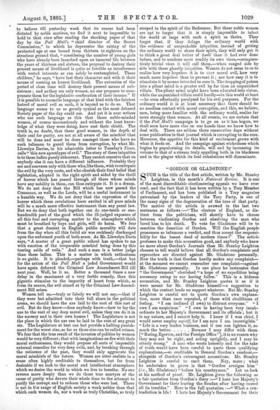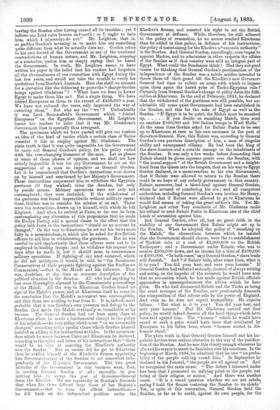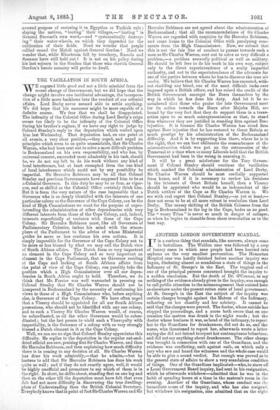"GORDON OR GLADSTONE ?"
SUCH is the title of the first article, written by Mr. Stanley Leighton, in this month's National Review. It is one of the most discreditable electioneering appeals we have ever read, and the fact that it has been written by a Tory Member of Parliament, and has been published in a Tory magazine patronised by the leaders of the Tory Party, is one of the many signs of the degeneration of the tone of that party. The motive of the article is avowed in the last two sentences as follows :—" The electors of England, as dis- tinct from the politicians, will shortly have to choose between vindicating Gordon and absolving the man who lured him to his death. To vote for Gladstone will be to sanction the desertion of Gordon. Will the English people pronounce so infamous a verdict, and thus accept the responsi- bility for the basest deed of modern times ?" The article professes to make this accusation good, and anybody who knew no more about Gordon's Journals than Mr. Stanley Leighton chooses to tell would believe that all Gordon's complaints and reproaches are directed against Mr. Gladstone personally. Now the truth is that Gordon hardly makes any complaint— at the moment we cannot remember one complaint—against Mr. Gladstone personally. In one place he insinuates that "the Government" cherished "a hope of no expedition being necessary owing to our having fallen." This is a hideous accusation, and Mr. Stanley Leighton quotes it as if it were meant for Mr. Gladstone himself—a suggestion to which the context lends no support whatever. But Mr. Stanley Leighton is careful not to quote Gordon's own explana- tion, more than once repeated, of those wild ebullitions of feeling. "I am inclined (I own) to distrust everyone." "I own I am suspicious." "I own to having been very insub- ordinate to her Majesty's Government and its officials ; bat it is my nature, and I cannot help it. I know if I was chief, I would never employ myself, for I am sure I am incorrigible."
"Life is a very leaden business, and if one can lighten it, so much the better Because I may differ with them [" Baring, Egerton, and the Foreign Office "], it is no reason why they may not be right, and acting uprightly, and I may be utterly wrong." A man who wrote honestly and for the sake of truth would have been careful to quote these qualifying explanations,—so creditable to General Gordon's candour,— alongside of Gordon's extravagant accusations. Mr. Stanley Leighton is careful to omit them. Nay, more ; what he undertakes to prove is that "Gordon arraigns him" (i.e., Mr. Gladstone) "before his countrymen." Let us look at his method of proof. Mr. Leighton gives the following as a fair quotation from Gordon's diary :—" I hate her Majesty's Government for their leaving the Soudan after having caused all its troubles." Here is the full quotation :—" What a con- tradiction is life ! I hate her Majesty's Government for their leaving the Bandon after having caused all its troubles ; yet I believe our Lord rules heaven and earth ; so I ought to hate him, which I (sincerely) do not." Mr. Leighton, that is, so garbles Gordon's meaning as to make him say something quite different from what he actually does say. Gordon refers to his own hatred of the Government as one of the irrational contradictions of human nature, and Mr. Leighton, stopping at a semicolon, quotes him as simply saying that he hated the Government, In truth, Mr. Leighton seems to have written his paper in the belief that his readers had forgotten all the circumstances of our connection with Egypt during the last few years, and would not take the trouble to verify his quotations from Gordon's Journals. How else shall we account for a quotation like the following to prove the "charge Gordon brings against Gladstone"? "What have we done in Lower Egypt to make them like us ? Not a single thing. We have foisted Europeans on them to the extent of £450,000 a year. We have not reduced the taxes, only improved the way of extorting them." But who are the " we " V Undoubtedly it was Lord Beaconsfield's Government which "foisted Europeans" on the Egyptian Government. Mr. Leighton leaves his readers to infer that it was Mr. Gladstone's Government that is specially thus arraigned.
The specimens which we have quoted will give our readers an idea of the kind of tactics which a certain class of Tories consider it fair to employ against Mr. Gladstone. The plain truth is that it was quite impossible for the Government to carry out General Gordon's policy, for his policy varied with the ever-changing humours of the man. Let us glance at some of these phases of opinion, and we shall see how utterly impossible it was for any Government to act on the suggestions of a man so impulsive as General Gordon. Let it be remembered that Gordon's instructions were drawn up by himself and sanctioned by her Majesty's Government. Those instructions empowered him to withdraw the Egyptian garrisons (if they wished) from the Soudan, but only by pacific means. Military operations were not only not contemplated ; they were excluded. If the withdrawal of the garrisons was found impracticable without military opera- tions, Gordon was to consider his mission at an end. Those were the instructions, drawn up by himself, with which he left England. And when he arrived at Cairo, so far was he from contemplating any alteration of this programme that he made Sir Evelyn Baring add a special clause to the effect that the policy laid down in the instructions "should on no account be changed." On the way to Khartoum he set out his views more fully in a memorandum, in which also he asked for five British officers to aid him in withdrawing the garrisons. But he was careful to add emphatically that those officers were not to be employed in leading troops ; and he withdrew his request two days after he made it, lest it should seem to countenance military operations. If fighting of any kind occurred, .which he did not anticipate, it would, he said, be "the Sondanese Conservatives of their property fighting against the Sondanese Communists,"—that is, the Mahdi and his followers. That was, doubtless, at the time an accurate description of the political situation in the Soudan. All who had anything to lose were thoroughly alarmed by the Comeaunistic proceedings of the Mahdi. All the way to Khartoum Gordon found no sign of the Mahdi's power, and at Khartoum itself he came to the conclusion that the Mahdi's movement was contemptible, and that there was nothing to fear from it. It is, indeed, most probable that it was Gordon's own presence and doings in the Soudan that made the Mahdi eventually so formidable as he became. For General Gordon had not been many days at Khartoum when he made a fundamental change in the policy of his mission,—the very policy which must "on no account be changed," according to the special clause which Gordon himself insisted on adding to his instructions at Cairo. In the memoran- dum which he wrote between Cairo and Khartoum he declared, according to the spirit and letter of his instructions that " there would be no idea of asserting the Khedive's authority over the Soudan." But no sooner did he get to Khartoum than he availed himself of the Khedive's firman appointing him Governor-General of the Soudan to act somewhat inde- pendently of her Majesty's Government. The two great mistakes of the Government in this business were, first, in sending General Gordon at all ; secondly, in per- mitting him to accept the post of Governor-General from the Khedive. We see repeatedly in Gordon's Journals that when his views differed from those of her Majesty's Government,—that is, from his official instructions,— he fell back on his independent position under the Khedive's firman, and asserted his right to set the British Government at defiance. While, therefore, he still adhered to the policy of evacuation, he no sooner reached Khartoum than he added to that policy, in defiance of his instructions, the policy of maintaining for the Khedive a" suzerain authority" in the Soudan. And General Gordon, accordingly, soon began to appoint Mudirs, and to administer in other respects the affairs of the Soudan as if that country were still an integral part of Egypt. What could the Soudanese think ? Had they not good. reason for thinking that General Gordon's proclamation of the independence of the Soudan was a subtle artifice intended to throw them off their guard till the Khedive's new Governor- General had time to collect an army with which to impose upon them again the hated yoke of Turko-Egyptian rule ? Certainly from General Gordon's change of policy dates his diffi- culties at Khartoum. In the end of February, 1884, he declared that the withdrawal of the garrisons was still possible, but un- advisable till some quiet Government had been established in the Soudan, and this for the sake of Egypt as well as the Soudan. "If Egypt is to be quiet, the Mahdi must be smashed up. If you decide on smashing Mahdi, then send up another £100,000 and 200 Indian troops to Wadi Haifa." At-the same time Gordon asked for Zubair Pasha to be sent up to Khartoum at once as his own successor in the post of Governor-General. Now, this Zubair was, according to General Gordon's own previous description of him, a man of singular ability and unsurpassed villainy. He had been the king of the slave-hunters and a notable scourge to the inhabitants of the Soudan. It was only a few weeks before demanding that Zubair should be given supreme power over the Soudan, with "the moral support" of the British Government and a knight- hood from the Queen into the bargain, that on his way to Egypt Gordon declared, in a memorandum to his own Government, that if Zubair were allowed to return to the Soudan there could be no hope of any orderly government in that country. Zobair, moreover, had a blood-feud against General Gordon, whom he accused of murdering his son ; and all competent authorities, including General Gordon's own brother, Sir Henry, declared that if Zubair were allowed to go to Khartoum he would find means of taking the great soldier's life. Yet Mr. Leighton and other Tory assailants of Mr. Gladstone make his refusal to send. Zubair Pasha to Khartoum one of the chief heads of accusation against him.
But General Gordon, after all, had no great faith in the stability of any Government that Zubair might set up in the Soudan. When he adopted the policy of "smashing up the Mahdi," the alternatives between which he insisted that the Government should choose, were the re-establishment of Turkish rule, at a cost of £2,000,000 to the British Exchequer; and a Government under Zubair, who was to receive £500,000 down, and an income for a time of £100,000 or £200,000. "In both cases," says General Gordon," slave trade will flourish." And "if Zubair fails, after some time, what is it to you You did your beat, and save your honour." If General Gordon had reflected seriously, instead of always writing and acting on the impulse of the moment, he would have seen that no accusation which he has made against British officials approaches in unscrupulousness the advice which he here gives. He who had denounced Zubair and the Turks as being the cruel scourges of the Soudan, now passionately demands the reimposition of that odious rule by the power of England. And even so, he does not expect tranquillity. He expects failure. "But what is it to you ? You did your best, and save your honour." Had Mr. Gladstone carried out that policy, he would indeed deserve all the hard things which have been said against him. The " honour " which he would have saved at such a price would have been that attributed by Tennyson to his fallen hero, whose "honour rooted in dis- honour stood."
The plain truth is, that General Gordon himself and his im- pulsive devices were serious obstacles in the way of the pacifica- tion of the Soudan. And he saw this clearly enough whenever he allowed his reason to assert its dominion over his emotions. In the beginning of March, 1884, he admitted that he saw "no proba- bility of the people rallying round him." In September he declared in his Journal, "the people are all against us." And he recognised the main cause. The defect I laboured under has been that I presented no rallying point to the people, not being of their religion or nation." And there was another cause. "It is a vexed question whether we are not rebels, seeing I hold the firman restoring the Soudan to its chiefs." Yet, in spite of this restoration, General Gordon held the Soudan, as far as he could, against its own people, for tne avowed purpose of restoring it to Egyptian or Turkish rule; slaying the natives, "looting" their villages,—" looting" is General Stewart's own word,—and "systematically destroy- ing" their water-wheels, on which they depended for the cultivation of their fields. Need we wonder that people rallied round the Mahdi against General Gordon ? Need we wonder that, while Khartoum fell by treachery, Kassala and Sennaar have still held out ? It is not on his policy daring his last sojourn in the Soudan that those who cherish General Gordon's heroic memory will prefer to dwell.




































 Previous page
Previous page